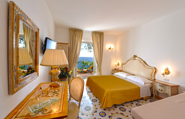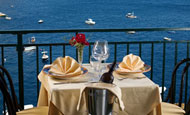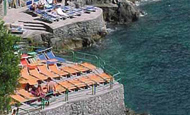ISCHIA

 When
the Greeks arrived on this coast more than 2,500 years ago, they first
landed in Ischia. Only a few miles off the tip of Pozzuoli, Capo Miseno,
Ischia was a perfect base from which the Greeks could reach the mainland.
They quickly found what was to become their largest and most important city
on this coast: Cuma, on the hill above the Phlegrean Fields and modern
Pozzuoli. Ischia knew little development during antiquity and the Middle
Ages because of its very active volcano – Monte Epomeo – which erupted for
the last time in the 14th century. That is when the island’s
growing population led to the development of the spa industry with the
opening of the first thermal establishment in Casamicciola Terme in 1604.
The island itself, however, went relatively undiscovered by tourists until
the 1950s, when well-to-do Italians came here in the hopes of finding an
alternative to overcrowded Capri. Although Ischia is more popular now than
it was then, the atmosphere is quieter than on Capri – partly because people
who come here usually stay for several stay and are looking for quiet, not
celebrities.
When
the Greeks arrived on this coast more than 2,500 years ago, they first
landed in Ischia. Only a few miles off the tip of Pozzuoli, Capo Miseno,
Ischia was a perfect base from which the Greeks could reach the mainland.
They quickly found what was to become their largest and most important city
on this coast: Cuma, on the hill above the Phlegrean Fields and modern
Pozzuoli. Ischia knew little development during antiquity and the Middle
Ages because of its very active volcano – Monte Epomeo – which erupted for
the last time in the 14th century. That is when the island’s
growing population led to the development of the spa industry with the
opening of the first thermal establishment in Casamicciola Terme in 1604.
The island itself, however, went relatively undiscovered by tourists until
the 1950s, when well-to-do Italians came here in the hopes of finding an
alternative to overcrowded Capri. Although Ischia is more popular now than
it was then, the atmosphere is quieter than on Capri – partly because people
who come here usually stay for several stay and are looking for quiet, not
celebrities.
 Ischia
is the largest of Campania ‘s islands – its velvety slopes
green with pine woods and vineyards – hence its nickname Isola
Verde (Emerald Isle). Mount Epomeo – the volcano – has long
been dormant, but the island shows significant volcanic
activity with its many hot springs, mineral waters, and steam
and hot mud holes. These are extensively used by the island’s
many spas; hence Ischia’s other nickname , Island of Eternal
Youth.
Ischia
is the largest of Campania ‘s islands – its velvety slopes
green with pine woods and vineyards – hence its nickname Isola
Verde (Emerald Isle). Mount Epomeo – the volcano – has long
been dormant, but the island shows significant volcanic
activity with its many hot springs, mineral waters, and steam
and hot mud holes. These are extensively used by the island’s
many spas; hence Ischia’s other nickname , Island of Eternal
Youth.
The island’s shore alternates between rugged cliffs and
beautiful beaches.
With over 150 spas on the island, plus open-air facilities,
including natural pools and steam holes, Ischia is a huge
thermal resort.
















